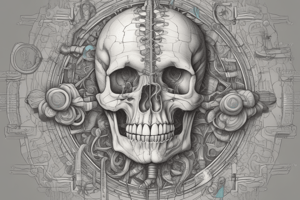Podcast
Questions and Answers
What is a word root?
What is a word root?
- A word element placed at the end of a word root.
- A word element attached to the beginning of a word root.
- The word root plus the combining vowel.
- The foundation of a medical term that provides the basic meaning. (correct)
What is a combining form?
What is a combining form?
- A word element placed at the end of a word root.
- A word element attached to the beginning of a word root.
- The word root plus the combining vowel. (correct)
- A word root indicating negation.
What does a suffix generally indicate in medical terminology?
What does a suffix generally indicate in medical terminology?
A procedure, condition, disease, or part of speech.
Define the ______ part of the word first.
Define the ______ part of the word first.
Define the ______ part of the word second.
Define the ______ part of the word second.
Define the ______ part of the word last.
Define the ______ part of the word last.
Rule #1 states that a word root links a suffix that begins with a:
Rule #1 states that a word root links a suffix that begins with a:
What does Rule #2 indicate?
What does Rule #2 indicate?
What does Rule #3 indicate?
What does Rule #3 indicate?
What is a macron?
What is a macron?
What is a breve?
What is a breve?
How do you pronounce 'ae' and 'oe'?
How do you pronounce 'ae' and 'oe'?
What does the letter 'c' sound like before 'e', 'i', and 'y'?
What does the letter 'c' sound like before 'e', 'i', and 'y'?
What does 'g' sound like before 'e', 'i', and 'y'?
What does 'g' sound like before 'e', 'i', and 'y'?
In which context is 'ch' pronounced like 'k'?
In which context is 'ch' pronounced like 'k'?
How is 'pn' pronounced at the beginning of a word?
How is 'pn' pronounced at the beginning of a word?
How is 'pn' pronounced in the middle of a word?
How is 'pn' pronounced in the middle of a word?
When 'ps' appears at the beginning of a word, which letter is silent?
When 'ps' appears at the beginning of a word, which letter is silent?
How are the letters 'e' and 'es' pronounced as final letters of a word?
How are the letters 'e' and 'es' pronounced as final letters of a word?
How is 'i' pronounced at the end of the word?
How is 'i' pronounced at the end of the word?
Greek roots build words that describe ______.
Greek roots build words that describe ______.
Latin roots build words that describe ______.
Latin roots build words that describe ______.
Flashcards are hidden until you start studying
Study Notes
Word Roots and Structure
- Word root serves as the foundation of a medical term, indicating the body system or part involved.
- A medical term can consist of multiple word roots.
Combining Form
- Formed by adding a combining vowel to a word root, written with a "/" (e.g., cardi/o).
- Used for ease of pronunciation when linking to other elements.
Suffix
- A word element at the end of the root that alters its meaning, often indicating a procedure, condition, disease, or part of speech.
Prefix
- An element attached to the beginning of a word or root, indicating number, time, position, direction, or negation.
Order of Definition
- Suffix should be defined first.
- Prefix is defined second.
- Word root is defined last.
Linking Rules
- Rule #1: A word root (WR) links to a suffix starting with a vowel (e.g., scler/ -osis).
- Rule #2: A combining form (CF) links to a suffix starting with a consonant (e.g., colon/ o/ -scope).
- Rule #3: A combining vowel (CV) links a WR to another WR (e.g., oste/o arthr/ -itis).
Pronunciation Guides
- Macron (¯) indicates a long sound.
- Breve (ˇ) indicates a short sound.
- "ae" and "oe" are pronounced like the second vowel (e.g., bursae).
- "s" and "j" have distinct sounds based on their context.
- "c" and "g" have soft sounds before e, i, y and hard sounds elsewhere.
- "ch" is sometimes pronounced as "k" (e.g., cholesterol).
- Initial "pn" is pronounced as "n" (e.g., pneumonia); "pn" in the middle has hard sounds (e.g., orthopnea).
- Initial "ps" features a silent "p" (e.g., psychology).
- Final "e" and "es" often sound as separate syllables (e.g., syncope).
- "i" at the end of a word forms a plural sound pronounced "eye" (e.g., bronchi).
Diacritical Marks and Capitalization
- Aid in pronunciation and proper understanding of medical terms.
Greek and Latin Roots
- Greek roots often describe conditions, while Latin roots typically describe anatomical structures.
Studying That Suits You
Use AI to generate personalized quizzes and flashcards to suit your learning preferences.




